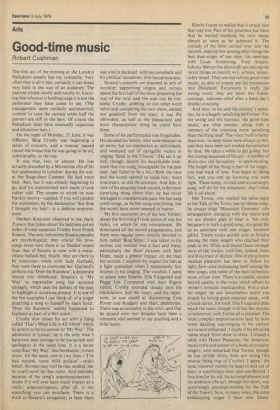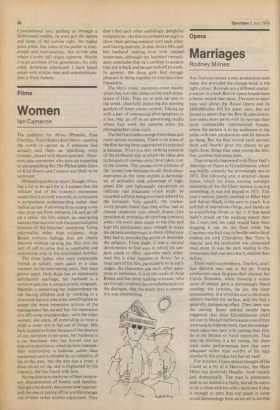Arts
Good-time music
Robert Cushman
The first act of the evening at the London Palladium usually has my sympathy. Very often that is all it has; certainly it can boast very little in the way of an audience. The patrons trickle slowly and noisily in, knowing that whoever is holding stage it is not the performer they have come, to see. (The management seem similarly unconcerned, content to raise the curtain while half the punters are still in the bars. Of course the Palladium does have unusually capacious and attractive bars.) On the night of Monday, 21 June, it was different. Bing Crosby was beginning a series of concerts, and a rumour passed round the house that he was going to be on unbelievably, at the top.
It was true, too, or almost. He was actually preceded by a Movietone clip of his last appearance in London: during the war, at the Stage-door Canteen. He had more hair, then, but it was already beginning to go, and his outstretched ears made it look rather odd. The toupee to which he now frankly resorts—capped, if you will pardon the expression, by the declaration 'this time I brought my hair'—is a definite improvement.
Herbert Kretzmer observed in the Daily Express that jokes about his baldness are an index of what separates Crosby from Frank Sinatra. The only infirmities Sinatra parades are psychological; they colour his lovesongs (even now there is no bleaker sound than that of Sinatra in tune with a masochistic ballad) but, finally, they are there to be overcome—while with Judy Garland, they were there to overcome her. Garland's anthem was 'Over the Rainbow', a desperate retreat into childhood; Sinatra's is 'My Way' (a regrettable song but accurate enough), which uses the defeats of the past to highlight a victorious present. It is one of the few examples I can think of, of a singer attaching a song to himself by main force; 'Over the Rainbow' merely happened to Garland as part of a film score.
Crosby now closes his act with a thing called 'That's What Life is All About' which he admits to be his answer to 'My Way'. The admission is typical; he is the only man I have ever seen manage to be insouciant and apologetic at the same time. It is a better song than 'My Way', less bombastic ; it even scans. All the same, one or two lines—Tve had success, some mild acclaim'—strain belief; the man may well be that modest, but he could never be that naive. And precisely because of the song's unpretentiousness I doubt if it will ever have much impact as a credo; unassumingness, after all, is not something you can proclaim. There is a thrill to Sinatra's arrogance; at least there was until it declined, with his comeback and his political turnabout, into bumptiousness.
Sinatra's concerts are planned as acts of worship; supporting singers and comics spend the first half of the show preparing the way of the lord, and the wait can be tiresome. Crosby, ambling on (no other word suits). and compering his own show, earned our goodwill from the start ; it was the shrewdest, as well as the pleasantest and most characteristic thing he could have done.
Some of his performance was forgettable. He paraded his family, who were pleasant as an entity but no impression as individuals, and ventured out of navigable waters in singing 'Send in the Clowns'. (He set it up well, though, despite his inexplicable statement that this song, inescapable for the past year, had failed to be a hit.) Both the tune and the words seemed to elude him; more important, so did the emotion. And this, in view of his amazing track-record, is the most surprising thing about him : he has never managed to communicate pain. He has sung torch songs, as he has sung everything, but the words have never seemed to matter.
My first memories are of the late 'forties; about the first thing I took notice of Was the radio, on which he was omnipresent. He dominated all the record programmes, and there were regular spots entirely devoted to him, called 'Bing Sings'. I was taken to his movies (my mother was a fan) and these, particularly the Road pictures with Bob Hope, made a greater impact on me than the records. I retained my respect for him as a light comedian when I temporarily lost interest in his singing. The vocalists I came to adore were Sinatra, Ella Fitzgerald and Peggy Lee. Compared with their filigree voices, Crosby sounded cloudy (not the enunciation, just the tone); and his repertoire, to one elated at discovering Cole Porter and Rodgers and Hart, pedestrian. There was no sexuality in his voice, and that he should over two decades have been a romantic idol seemed to me puzzling and a little funny.
Slowly I came to realise that it struck him that way too. Part of his greatness has been that he started mocking his own status almost as soon as he achieved it. The comedy of the films carried over into the records, making him among other things the best duet-singer of our time; his meetings with Louis Armstrong, Fred ,Astaire, Johnny Mercer (he above all) are among the nicest things on record, wry, urbane, impeccably timed. They are marvellous good-time music, as also of course are his excursions into Dixieland. Excursions is really the wrong word ; they are more like homecomings, welcome relief after a hard day's doleful crooning.
And now, in his and the century's seventies, he is a hugely satisfying performer. For the swing and the humour, the good-time music, are what remain, along with a memory of the crooning more satisfying than the thing itself. The voice itself is better than ever; its deep notes were always its best and they have been not eroded but enriched by time. He takes a while to get going; but the closing sequence of his act—a medley of thirty-two old favourites—is spell-binding. The length of the thing is part of the magic; you lose track of time. You begin by liking him, and you end up knowing you were right. These songs, in total and so cunningly sung, will do for his testament ; that's what life is all about.
Mel Torme, who opened the same night at the Talk of the Town, has no theme song; he always sings 'Mountain Greenery' (the arrangement changing with the years) and we are always glad to hear it, but only because it is such a good song; too good for us to associate with one singer, however gifted. Torme ranks second only to Sinatra among the male singers who reached their peak in the 'fifties and stayed there through most of the 'sixties; with him, indeed, there is still no trace of decline. One of my greatest musical pleasures has been to follow his light, firm voice insinuating itself among the best songs, and some of the best orchestrations, of our time. There is a candid, almost boyish quality to the voice which offsets its owner's intricate musicianship. Not a soulful singer, he can nevertheless move you simply by letting good material speak, with crystal clarity, for itself. Ella Fitzgerald does much the same, though with her the process is instinctive; with Torme all is planned. The most complex improvisations (and he does some dazzling scat-singing in his current act) sound rehearsed; I doubt if his phrasing varies much from show to show. I shared a table with Henry Pleasants, the American music critic and author of a book on popular singers, who remarked that Torme, though he has terrific drive, does not swing (the reverse being true of Crosby). I agree; the tone, however nimbly he leaps in and out of keys, is surprisingly even and uninflected. I love him for his wit, his accomplishment and his ambition (the act, though too short, was surprisingly uncompromising for the Talk of the Town); he is, in many ways, the most exhilarating singer I have ever heard.
Conscientious too; guiding us through a Hollywood medley, he even got the names and dates of the movies right. He makes good jokes, but some of his patter is overornate and over-anxious; this is-one area where Crosby still reigns supreme. Maybe it is an attribute of his generation: the only other American entertainer I have heard speak with similar ease and unpretentiousness is Fred Astaire:



































 Previous page
Previous page